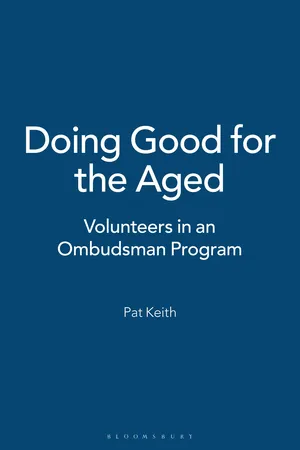
- 176 pages
- English
- PDF
- Available on iOS & Android
About this book
This book is about the subjective and objective outcomes of the work of volunteer advocates in nursing facilities. The majority of the volunteers were older, and they served older persons through their work in an ombudsman program. The extent of involvement of older persons in volunteering suggests its importance to them, and it increasingly sustains human service programs for both the young and old. Despite an increased emphasis on independent and assisted living for older persons, the need for oversight of care, welfare, and rights of the aged in nursing facilities remains. Indeed, in recognition of the need to provide advocacy services for vulnerable elderly, the Older Americans Act was amended in 1978 to require states to establish nursing home ombudsman/advocacy programs. Ombudsman programs are based on the assumption that community involvement through volunteers will have a watchdog effect on behalf of residents and increase accountability among staff and administrators of nursing homes. The present study reveals volunteers' experiences in ombudsman programs. It provides insight into volunteers' thoughts about their work and their capabilities prior to their involvement as well as independent measures of the work of volunteers.
Frequently asked questions
- Essential is ideal for learners and professionals who enjoy exploring a wide range of subjects. Access the Essential Library with 800,000+ trusted titles and best-sellers across business, personal growth, and the humanities. Includes unlimited reading time and Standard Read Aloud voice.
- Complete: Perfect for advanced learners and researchers needing full, unrestricted access. Unlock 1.4M+ books across hundreds of subjects, including academic and specialized titles. The Complete Plan also includes advanced features like Premium Read Aloud and Research Assistant.
Please note we cannot support devices running on iOS 13 and Android 7 or earlier. Learn more about using the app.
Information
Table of contents
- Contents
- List of Tables
- Acknowledgments
- 1. Introduction
- 2. Procedures and Characteristics of the Sample
- 3. Pathways to Volunteering: Interests and Skills of Volunteers
- 4. Expected and Actual Difficulties of Volunteer Advocates
- 5. Social-Psychological Outcomes of Volunteering: Effects of Demographic Characteristics, Training and Education Activities, and Participation
- 6. Correlates of Primary Orientations of Volunteers
- 7. Advocacy for the Aged in the Country and in the City
- 8. Role Orientations, Attributions to Nursing Facility Personnel, and Unresolved Complaints of Volunteers
- 9. Support from Others and Efficacy of Volunteers
- 10. Training and Education Activities, Efficacy, and Worry among Volunteers
- 11. Images of Volunteerism: Personal Descriptions of Benefits, Advice, and Recommendations
- 12. Concluding Thoughts about Implications for Practice
- References
- Index